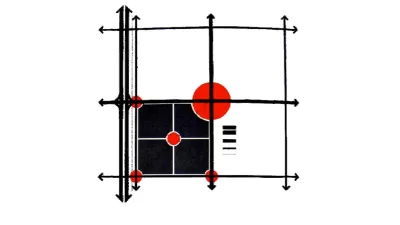Exclusives
BLOG POST
Hold off on Zipcar’s Eulogy: Planners are Key to Carsharing’s Next Act
The recent purchase of Zipcar by Avis is just the latest sign that carsharing is in a period of flux. As shared-mobility evolves in the next few years, planners can play a crucial role in ensuring that the industry serves those in need of alternatives to car ownership, generates revenues for municipalities, integrates with public transportation, and delivers wider benefits.
BLOG POST
Good Urban Parks and Our Wellbeing
Broadening our definition of parks to recognize their role in preventative health care and promotion will only expand our awareness on how important they are to good neighbourhood design.
BLOG POST
Density Reduces Driving (Even At Pretty High Densities)
Research supports the argument that increased densities reduce vehicle miles traveled, even in areas with minimal transit service.
BLOG POST
Measuring Transport System Efficiency
There are various ways to define transport efficiency which can lead to very different conclusions as to what transport policies and projects are best overall. Conventional planning tends to evaluate transport system performance based on mobility, which assumes that faster travel is always better. A new planning paradigm evaluates transport system performance based on accessibility (people's ability to access services and activities) which leads to very different definitions of efficiency and very different conclusions about how to improve transport systems.
BLOG POST
A New Year's Eve Call to Action for Urbanists
We've known for decades the better ways to do things, for greater urban health, sustainability, resiliency, vibrancy and economic success. So this year, let's resolve to have the will and skill to get past the short-term politics, the rhetoric, the market momentum, and the financial self-interest that has kept our better solutions from being realized.
BLOG POST
Tactical Urbanism: A Look Back at 2012
From guerrilla wayfinding to future-tising, these are my top five, perhaps lesser known, highlights of a banner year for Tactical Urbanism.

FEATURE
Top 10 Books - 2013
Planetizen is pleased to release its eleventh annual list of the ten best books in urban planning, design and development published in 2012.
BLOG POST
Do Environmentalists Feed The Fire of Climate Change Denial?
Despite the extreme weather events of the past year, most Americans are still not persuaded that climate change is primarily the result of human activity. Why not?
BLOG POST
Better Living through Information: Big Data and Urban Systems
The emerging methods of urban governance, planning, design, and management made possible by technological advances in data collection, analysis, and communication promise to make our cities better, and more efficient, places to live. The Urban Systems Collaborative, a unique gathering of voices from academia and industry, is fostering a discussion about improving our cities through technology.
BLOG POST
Green Building in Affordable Housing Reaches Critical Mass
Green building has become a fundamental element of many states Qualified Allocation Plans (QAPs), which guide the distribution of the Federal Low-Income Housing Tax Credit program.

FEATURE
Top Twitter Feeds 2012
We've augmented our comprehensive list of Twitter's top sources for news and observations about urban planning, design and development by recognizing this year's Top Ten Feeds.
BLOG POST
Toward Comprehensive and Multi-Modal Performance Evaluation
One of planners’ most important jobs is to help develop the indicators and frameworks use to define problems and evaluate potential solution. Often, a particular solution will seem cost effective and beneficial when evaluated one way, and wasteful and undesirable if evaluated another. It is important that we help develop comprehensive evaluation frameworks that effectively inform decisions.
BLOG POST
TechniCity: The most fascinating technologies shaping cities
Course explores how the increasing availability of networks, sensors and mobile technologies allows for new approaches to address the challenges that our cities face.
BLOG POST
No, Cars Are NOT Greener than Buses (Even Almost-Empty Ones)
Even in cities without world-class transit systems, transit can reduce car ownership to some extent.
BLOG POST
From Sparks of Brilliance to Waves of Reform
Bottom-up urbanism, now becoming increasingly popular in the academy under the rubrics of “do-it-yourself (DIY) urbanism”; “guerilla urbanism”; “tactical urbanism” etc., are the surest sparks of brilliance and hope for our urban future.

FEATURE
Planetizen's Responsive Redesign
We have completely redesigned and rebuilt the Planetizen website. Enjoy the new features, a fresh new look, and a streamlined mobile-friendly design that's optimized for your laptop, tablet, and smartphone.

FEATURE
Back To The Future: The 1970 Los Angeles 'Centers' Concept Plan
The 1970 Concept Los Angeles plan is a history lesson for urban planners and a vision of what the city could have looked like.
BLOG POST
Greetings from Manila
Greetings from Manila where I'm attending the Asian Development Bank's Transport Forum 2012. It is an exciting and important event: the types of transport planning investments that the bank supports now can have huge impacts on the nature of future.

FEATURE
Jail the Planners for Not Preventing Sandy!
Ed Blakely indicts the planning profession for failing to protect our communities from the threat of a changing climate. How can we plan places that serve as bulwarks from the worst physical traumas, while providing economic and social resiliency?
BLOG POST
Shared Hardship and the Souls of Cities
I can't remember the last time I left the house and gave a moment's though to whether I'd be warm enough, or whether I needed to bring an umbrella. Meanwhile, half the East Coast is underwater right now.
Pagination
Smith Gee Studio
City of Charlotte
City of Camden Redevelopment Agency
City of Astoria
Transportation Research & Education Center (TREC) at Portland State University
US High Speed Rail Association
City of Camden Redevelopment Agency
Municipality of Princeton (NJ)
Urban Design for Planners 1: Software Tools
This six-course series explores essential urban design concepts using open source software and equips planners with the tools they need to participate fully in the urban design process.
Planning for Universal Design
Learn the tools for implementing Universal Design in planning regulations.


































